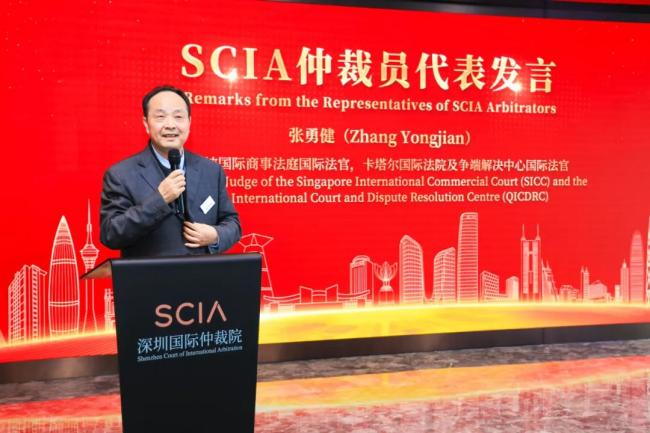
Zhang Yongjian’s speech at SCIA Spring Reception
Editor’s note:
On March 2, the Shenzhen Court of International Arbitration (SCIA), also known as the South China International Economic and Trade Arbitration Commission and the Greater Bay Area International Arbitration Center, held the SCIA SpringReception at the SCIA Tower.
Zhang Yongjian, a SCIA arbitrator and an international judge at both the Singapore International Commercial Court (SICC) and the Qatar International Court and Dispute Resolution Centre (QICDRC), delivered a speech as the representative of the Chinese arbitrators of the SCIA. Zhang served as a member of the Trial Committee of the Supreme People’s Court (SPC), president of the Civil Adjudication Tribunal No.1, Civil Adjudication Tribunal No.2, Civil Adjudication Tribunal No.4 of the SPC and vice-president of the 1st Circuit Court of the SPC.

Zhang Yongjian, an SCIA arbitrator and an international judge at both the Singapore International Commercial Court (SICC) and the Qatar International Court and Dispute Resolution Centre (QICDRC), delivers a speech as the representative of the Chinese arbitrators of the SCIA.
The following is an excerpt of his speech:
Thank you for the invitation to share at the SCIA SpringReception. Firstly, I extend my congratulations totheSCIA on its remarkable development and achievements.
Reflecting on my journey, serving at the Supreme People’s Court for a considerable period of time andattending the Committee Meeting of the 12th Session South China Business & Law Forum were impressive moments, which reminded me of myposition from a staff member of the SPC to now representing arbitrators, a transition that fills me with pride and gratitude.
Today, I'd like to share my insights from the perspectives of a judge and an arbitrator.
First, being an arbitrator is a source of pride. As arbitrators, we possess a significant level of discretion when resolving major disputes, far greater than that of judges. Unlike the constraints often faced in judicial work, arbitration allows for more flexibility. Moreover, the enforceability of arbitration awards, particularly internationally, surpasses that of court judgments. These are aspects that bring immense pride to arbitrators.
Second, along with a sense of pride comes a profound sense of responsibility. Arbitrators must recognize the weight of their decisions, understanding that their rulings can have far-reaching consequences. It’s crucial to maintain fairness and justice, anchored in adherence to the law.
Adjudicating according to the law requires more than just familiarity with legal provisions and principles—it demands a comprehensive understanding of industry practices, business norms, and societal dynamics. Simply applying legal knowledge without considering these factors risks falling into a mechanical approach. Effective arbitration entails not only laying the legal foundation but also incorporating real-world context and psychological insights into decision-making.
For instance, discussions at the Committee meeting this morning shed light on the economic landscape and real estate dynamics, underscoring the importance of contextual understanding in making informed judgments. Analyzing contracts involves not just legal analysis but also discerning the underlying motivations and psychological dynamics of the parties involved. Without this holistic approach, arbitration outcomes may lack acceptance and efficacy.
Finally, I would like to conclude my speech by expressing my sincere hope for SCIA’s continued advancement, propelled by collective efforts. Together, let us navigate towards a brighter future.
Thank you.
Navigation
Arbitration Rules Model Arbitration Clauses Find an Arbitrator SCIA Guidelines Online Case Filing Online Office Fee Calculation X



